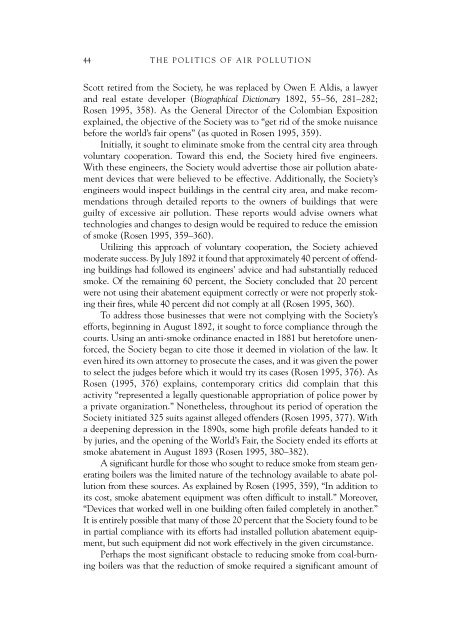THE FAILURE OF TECHNOLOGY 43The issue of cost was particularly paramount for the railroad industry. Inthe case of New York City, railroad firms electrified their lines because thesmoke emitted from coal burning locomotives proved to be a substantialsafety hazard within the tunnels in and around the city—with at least onemajor railroad accident within a tunnel attributed to locomotive-generatedsmoke. Also, the Pennsylvania Railroad ran many of its trains in Philadelphiaon electricity, beginning in the 1910s, because space in its crowded Philadelphiafacilities could be more efficiently used with electric locomotives(Stradling 1999, 112–114). While electric locomotives proved to be cleanand efficient, the railroad industry as a whole was heavily vested in steamlocomotives. One expert estimated that in the early part of the twentiethcentury the railroads owned approximately 70,000 steam locomotives, representinga total investment of $1.4 billion (Crawford 1913). Thus, in electrifyingtheir lines nationally, railroads would not only have to absorb the considerablecosts of doing so but these firms would have to effectively abandontheir significant investment in steam locomotives. In light of these factors, itis not surprising that the railroads consistently opposed any attempts toforcibly electrify their industry (Stradling 1999, chap. 6). Given this strongopposition, those economic elites in Chicago interested in cleaning the city’sair through the mandated electrification of those locomotives runningthrough the area backed down. This backpedaling is reflected in the secondreport put out by the Chicago Association of Commerce.THE LIMITS OF TECHNOLOGY IN AIR POLLUTION CONTROLWith regard to air pollution from factories, not only was there considerablecosts associated with the installation, maintenance, and usage of pollutionabatement technologies but the existing technological approaches to air pollutionabatement were in many cases unreliable. Moreover, the costs anduncertainties associated with air pollution abatement technology gave rise tofree rider problems. The difficulties of controlling coal-generated smokethrough the usage of technology becomes most apparent in light of an effortto control such smoke in anticipation of the Chicago World’s Fair in 1893.Leading members of Chicago’s business community in January 1892formed the Society for the Prevention of Smoke. As historian ChristineRosen (1995, 358) points out, “The founders of the Society were prominentlocal businessmen, ... and all but one of whom was also a Director” of thefair, otherwise known as the Colombian Exposition. Founders of the Societyincluded Bryan L. Lathrop, the organization’s president, and a real estatedeveloper and investment banker. Also on the Society’s board of directorswere Samuel W. Allerton, a banker and cattle rancher, who helped foundChicago’s Union Stockyard Company and was a director of a local street railwaycompany, and James W. Scott, publisher of the Chicago Herald. When
44THE POLITICS OF AIR POLLUTIONScott retired from the Society, he was replaced by Owen F. Aldis, a lawyerand real estate developer (Biographical Dictionary 1892, 55–56, 281–282;Rosen 1995, 358). As the General Director of the Colombian Expositionexplained, the objective of the Society was to “get rid of the smoke nuisancebefore the world’s fair opens” (as quoted in Rosen 1995, 359).Initially, it sought to eliminate smoke from the central city area throughvoluntary cooperation. Toward this end, the Society hired five engineers.With these engineers, the Society would advertise those air pollution abatementdevices that were believed to be effective. Additionally, the Society’sengineers would inspect buildings in the central city area, and make recommendationsthrough detailed reports to the owners of buildings that wereguilty of excessive air pollution. These reports would advise owners whattechnologies and changes to design would be required to reduce the emissionof smoke (Rosen 1995, 359–360).Utilizing this approach of voluntary cooperation, the Society achievedmoderate success. By July 1892 it found that approximately 40 percent of offendingbuildings had followed its engineers’ advice and had substantially reducedsmoke. Of the remaining 60 percent, the Society concluded that 20 percentwere not using their abatement equipment correctly or were not properly stokingtheir fires, while 40 percent did not comply at all (Rosen 1995, 360).To address those businesses that were not complying with the Society’sefforts, beginning in August 1892, it sought to force compliance through thecourts. Using an anti-smoke ordinance enacted in 1881 but heretofore unenforced,the Society began to cite those it deemed in violation of the law. Iteven hired its own attorney to prosecute the cases, and it was given the powerto select the judges before which it would try its cases (Rosen 1995, 376). AsRosen (1995, 376) explains, contemporary critics did complain that thisactivity “represented a legally questionable appropriation of police power bya private organization.” Nonetheless, throughout its period of operation theSociety initiated 325 suits against alleged offenders (Rosen 1995, 377). Witha deepening depression in the 1890s, some high profile defeats handed to itby juries, and the opening of the World’s Fair, the Society ended its efforts atsmoke abatement in August 1893 (Rosen 1995, 380–382).A significant hurdle for those who sought to reduce smoke from steam generatingboilers was the limited nature of the technology available to abate pollutionfrom these sources. As explained by Rosen (1995, 359), “In addition toits cost, smoke abatement equipment was often difficult to install.” Moreover,“Devices that worked well in one building often failed completely in another.”It is entirely possible that many of those 20 percent that the Society found to bein partial compliance with its efforts had installed pollution abatement equipment,but such equipment did not work effectively in the given circumstance.Perhaps the most significant obstacle to reducing smoke from coal-burningboilers was that the reduction of smoke required a significant amount of
- Page 2: The Politics of Air Pollution
- Page 7: ContentsAcknowledgmentsviiONELocal
- Page 12 and 13: LOCAL GROWTH COALITIONS 3tion, such
- Page 14 and 15: LOCAL GROWTH COALITIONS 5how the U.
- Page 16 and 17: LOCAL GROWTH COALITIONS 7growth (Ta
- Page 18 and 19: LOCAL GROWTH COALITIONS 9In this pe
- Page 20 and 21: LOCAL GROWTH COALITIONS 11ity tend
- Page 22 and 23: LOCAL GROWTH COALITIONS 13In the ar
- Page 24 and 25: LOCAL GROWTH COALITIONS 15who reduc
- Page 26 and 27: LOCAL GROWTH COALITIONS 17cally mod
- Page 28 and 29: TWOPolitical Economy and thePolicym
- Page 30 and 31: THE POLICYMAKING PROCESS 21moves to
- Page 32 and 33: THE POLICYMAKING PROCESS 23eral gov
- Page 34 and 35: THE POLICYMAKING PROCESS 25groups
- Page 36 and 37: THE POLICYMAKING PROCESS 27Given in
- Page 38 and 39: THE POLICYMAKING PROCESS 29tions, t
- Page 40 and 41: THE POLICYMAKING PROCESS 31the Conf
- Page 42: THE POLICYMAKING PROCESS 33lars 199
- Page 45 and 46: 36THE POLITICS OF AIR POLLUTIONCOAL
- Page 47 and 48: 38THE POLITICS OF AIR POLLUTIONa go
- Page 49 and 50: 40THE POLITICS OF AIR POLLUTIONrush
- Page 51: 42THE POLITICS OF AIR POLLUTIONattr
- Page 55 and 56: 46THE POLITICS OF AIR POLLUTIONthe
- Page 57 and 58: 48THE POLITICS OF AIR POLLUTIONcrit
- Page 59 and 60: 50THE POLITICS OF AIR POLLUTIONwhen
- Page 61 and 62: 52THE POLITICS OF AIR POLLUTIONin t
- Page 63 and 64: 54THE POLITICS OF AIR POLLUTIONThe
- Page 65 and 66: 56THE POLITICS OF AIR POLLUTIONfirm
- Page 67 and 68: 58THE POLITICS OF AIR POLLUTIONinno
- Page 69 and 70: 60THE POLITICS OF AIR POLLUTIONThe
- Page 71 and 72: 62THE POLITICS OF AIR POLLUTIONFHA
- Page 73 and 74: 64THE POLITICS OF AIR POLLUTIONgone
- Page 75 and 76: 66THE POLITICS OF AIR POLLUTIONPres
- Page 78 and 79: FIVEThe Establishment ofAutomobile
- Page 80 and 81: AUTOMOBILE EMISSION STANDARDS 71ext
- Page 82 and 83: AUTOMOBILE EMISSION STANDARDS 73Ano
- Page 84 and 85: AUTOMOBILE EMISSION STANDARDS 75the
- Page 86 and 87: AUTOMOBILE EMISSION STANDARDS 77thr
- Page 88 and 89: AUTOMOBILE EMISSION STANDARDS 79was
- Page 90 and 91: AUTOMOBILE EMISSION STANDARDS 81exp
- Page 92 and 93: AUTOMOBILE EMISSION STANDARDS 83acc
- Page 94 and 95: AUTOMOBILE EMISSION STANDARDS 85Thu
- Page 96 and 97: AUTOMOBILE EMISSION STANDARDS 87A n
- Page 98 and 99: SIXDemocratic Ethics,Environmental
- Page 100 and 101: DEMOCRATIC ETHICS 91At the core of
- Page 102 and 103:
DEMOCRATIC ETHICS 93senior attorney
- Page 104 and 105:
DEMOCRATIC ETHICS 95ments mount cha
- Page 106 and 107:
DEMOCRATIC ETHICS 97frameworks, as
- Page 108 and 109:
DEMOCRATIC ETHICS 99mobiles and gas
- Page 110 and 111:
DEMOCRATIC ETHICS 101the ecological
- Page 112 and 113:
CONCLUSIONPolitical Power andGlobal
- Page 114 and 115:
CONCLUSION 105quality became manife
- Page 116:
CONCLUSION 107lation, the U.S. econ
- Page 119 and 120:
110THE POLITICS OF AIR POLLUTIONCHA
- Page 121 and 122:
112THE POLITICS OF AIR POLLUTION6.
- Page 123 and 124:
114THE POLITICS OF AIR POLLUTION4.
- Page 126 and 127:
BibliographyAcher, Robin. 2001. “
- Page 128 and 129:
BIBLIOGRAPHY 119Brienes, Marvin. 19
- Page 130 and 131:
BIBLIOGRAPHY 121Cole, Luke W., and
- Page 132 and 133:
BIBLIOGRAPHY 123——— . 2002. W
- Page 134 and 135:
BIBLIOGRAPHY 125——— . 1975.
- Page 136 and 137:
BIBLIOGRAPHY 127Hayward, Clarissa R
- Page 138 and 139:
BIBLIOGRAPHY 129——— . 2001. E
- Page 140 and 141:
BIBLIOGRAPHY 131——— . 1988.
- Page 142 and 143:
BIBLIOGRAPHY 133Perez-Pena, Richard
- Page 144 and 145:
BIBLIOGRAPHY 135Runte, Alfred. 1997
- Page 146 and 147:
BIBLIOGRAPHY 137Tarr, Joel A. 1996.
- Page 148:
BIBLIOGRAPHY 139Wiewel, Wim, and Jo
- Page 151 and 152:
142THE POLITICS OF AIR POLLUTIONChi
- Page 153:
144THE POLITICS OF AIR POLLUTIONTuc









